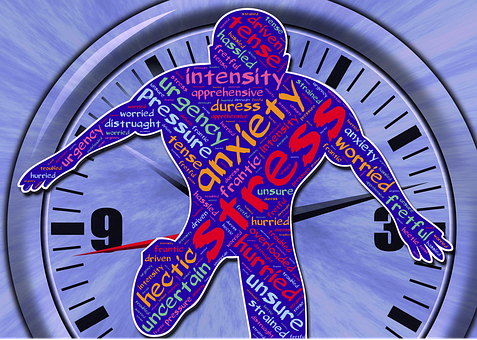Chronic stress is a common problem in today’s fast-paced world, but it can have negative consequences for your mind and body. It’s important to be able to recognize when you’re experiencing overwhelming stress, and to know what you can do to mitigate it.
Stress
When you’re stressed, your body goes into “fight or flight” mode. This is a natural reaction that happens when you sense danger. Your body’s defenses kick into high gear, and you may feel like you’re in danger even when you’re not.
In emergency situations, it can also save your life. The stress response is the body’s natural way of protecting you. It helps you stay focused and alert, and can even save your life in emergency situations.
When you’re in a life-threatening situation, stress can help you by giving you extra strength or causing you to react quickly to avoid an accident.
Stress can also have positive aspects, which are sometimes called “eustress.”
For example, it can help you handle challenges such as staying focused during a presentation at work, making a game-winning free throw, or studying for an exam when you’d rather be watching TV.
Beyond a certain point, stress is no longer helpful and starts to cause major damage.
Include relaxation techniques and healthy coping mechanisms in your daily routine If stress is overwhelming and impacting your health, mood, productivity, relationships, and quality of life, relaxation techniques and healthy coping mechanisms can help.
If you are regularly feeling stressed and overwhelmed, you should take action to help your nervous system recover.
You can improve your thinking and feeling by learning how to recognize the signs and symptoms of chronic stress and taking steps to reduce its harmful effects.
Eustress vs. Distress
You can think of stress as being on a spectrum, with “eustress” at one end and “distress” at the other. Eustress is the manageable levels of stress that can motivate you to meet challenges at work, school, or in your personal life. Distress is the more intense levels of stress that can cause physical and mental health problems.
Eustress may make you feel uncomfortable, but it can help you to do well in a job interview or on a first date, for example. It can also help you to finish a project at school or work that requires you to learn new skills.
Distress is the stress that makes you feel overwhelmed and can damage your mood and outlook, disrupt your sleep, and trigger health issues such as depression and anxiety.
You may feel distressed when you feel like you are not able to handle the amount of stress you are under. This can be due to feeling busy at work, not having enough money, or experiencing an illness or bereavement.
If, on the other hand, you take on the challenge with confidence and energy, you may experience eustress, which can be invigorating. The way you perceive stress determines whether it will be eustress or distress. If you feel confident and energetic about an upcoming work deadline, it will be eustress. If you feel worried, exhausted, and overwhelmed, it will be distress.
How Stress Works: The Body’s Fight-or-Flight Response
When you feel threatened, your nervous system releases a burst of stress hormones that prepare your body for emergency action.
Your heart rate will increase, you will feel your muscles tighten, your blood pressure will begin to rise, your breaths will come quicker, and your senses will become sharper.
The physical changes that occur when you are experiencing fear prepare your body to either fight or flee the danger. These changes include increased strength and stamina, faster reaction time, and enhanced focus.
The Effects of Stress
Your nervous system cannot tell the difference between emotional and physical threats.
If you’re feeling stressed about an argument with a friend, a work deadline, or anything else, your body can react just as strongly as if you’re in a life-or-death situation.
If your emergency stress system is constantly being activated, it becomes easier to trigger and harder to shut off.
If you’re frequently stressed, your body may be in a heightened state of stress most of the time, which can lead to serious health problems.
If you experience chronic stress, nearly every system in your body is disrupted. This includes your immune system, digestive and reproductive systems, and increases the risk of heart attack and stroke. Additionally, chronic stress ages you more quickly.
It can change the way the brain is wired, making you more vulnerable to anxiety, depression, and other mental health problems.
1. Poor Cognitive Functions
If you’re currently experiencing chronic stress, you may notice that you’re unable to think as clearly as you used to. Your ability to focus and concentrate may be impaired, and you may find yourself making more errors than usual. You may also feel forgetful and have trouble retaining new information.
Although you may not feel confident that your circumstances will improve, they can with a few lifestyle changes. However, if you don’t realize you’re stressed and don’t do anything about it, you’ll suffer the consequences.
Chronic stress can lead to memory problems like dementia and both short- and long-term memory loss.
People who don’t manage their stress well are more likely to get dementia or Alzheimer’s than those who do.
Help improve mood, memory, and cognition with Revive-It-All!
2. Heart Attacks
Stress has negative effects on the body. The body tries to help you reduce stress and prevent complications.
Chronic stress has been linked to an increased risk of heart attacks, even in otherwise healthy people. This risk is especially high in people over the age of 50.
3. Poor Focus
If you work a full-time job, you need to be able to focus while you’re there. Not paying attention will make it more likely you’ll make mistakes or have an accident. If you want to keep your job, you need to find a way to deal with your stress.
If you don’t want your stress to get out of control and cause bigger problems, you need to focus and not let it get the best of you.
Don’t let stress cause you to lose your job.
4. Stroke
Chronic stress has also been linked to stroke, which is a condition that can lead to temporary and permanent paralysis. Although there are ways to overcome some of the symptoms associated with a stroke, it can still be a setback.
A stroke can often lead to a long hospital stay, along with different treatments and medications. Physical therapy may also be necessary for several months. In some cases, people never recover from a stroke.
To reduce your risks, you will need to make significant changes to your lifestyle that will help you reduce your stress levels.
5. Fatigue
Stress can often lead to feeling tired and run down. If you don’t take care of yourself, you won’t have the energy to do your normal tasks or even get out of bed in the morning.
Fatigue can be caused by a variety of illnesses, such as cancer, vitamin deficiency, and autoimmune diseases.
You can still be fatigued even if you are not suffering from any conditions if your stress levels are very high. Fatigue can be hard to shake once it sets in.
6. Lack of Motivation
Most people feel unmotivated at some point or another. The problem starts when this lack of motivation persists for an extended period of time.
If you’re stressed out, you’ll eventually find it harder and harder to motivate yourself to get out of bed and get dressed every day.
Hitting the snooze button can become an uncontrollable habit, which can make you feel like you just want to stay in bed all day. However, this is not a healthy way to live.
If you stay in bed all day, you will miss out on opportunities to spend time with family and friends and you will miss out on life in general. Each day you spend in bed is a day you miss out on special events.
7. Obesity
People who have chronic high stress levels are often obese. Although this is not always the case, it is very common.
If you want to get rid of your excess weight, you will have to find a way to reduce the stress in your life. Your obesity is more likely due to overeating and lack of physical exercise, but it all goes back to chronic stress. If you want to lose weight, you need to find a way to reduce stress in your life.
Some people treat their chronic stress with food.
Those who are most at risk for obesity are those who consume high levels of calories but have low levels of physical activity.
When you’re stressed, it’s important to eat healthy to avoid weight gain and fight the effects of stress.
8. Low Self-Esteem
Your self-esteem could be low because of stress weight-gain, but it is more likely stemming from the way you are dealing with stress.
When you have low self-esteem, it will have a lot of negative consequences. This is especially true when you also have stress in your life. These things can take a toll on your mental and physical health.
9. Outbursts of Rage
It is common for people who experience chronic stress to also have periodic outbursts of anger.
If you can’t control your stress and anger, you’ll eventually lash out at the people closest to you, like your family and friends, or the people you work with.
While it may be frustrating, it’s not right to take your anger out on these individuals. Once you begin to feel rage boiling up, it may be time to leave. If you don’t do this, you will eventually push all of your friends and family away and nobody will want to be around you.
10. Chronic Depression
Chronic misery can be brought on by incessant pressure. You may not be aware that you’re depressed, because some individuals are unconscious of their circumstances. You may just be trudging around in a daze but reckon that it’s connected to not getting enough sleep.
Chronic depression is a condition that medical professionals believe needs to be dealt with as soon as possible.
Even if you are able to get a prescription for an antidepressant from a therapist or primary care physician, you will still need to focus on the underlying causes of your condition. One of the major causes of depression is chronic stress.
11. Thoughts of Suicide
If you find yourself wanting to die, it’s important to talk to a therapist right away. Stress can have a serious negative impact on your mental and physical health, and can lead to thoughts of suicide. However, suicide is never the answer.
Causes of Stress
However, anything that puts high demands on us can be a stressor The events or conditions that create stress are called stressors. We usually think of stressors as being unpleasant, such as an exhausting work schedule or a difficult relationship. However, anything that places demands on us can be a stressor.
Anything that puts high demands on you, including positive events, can be stressful.
Not all stress is caused by external factors.
Stress can come from within yourself when you worry excessively about something that may or may not happen, or when you have irrational, pessimistic thoughts about life.
The stress you experience is partly due to your perception of the situation.
What stresses you out may not have the same effect on someone else. They may even find it enjoyable. whereas some of us dread getting up in front of an audience to speak or perform, others love the attention.
One person may perform better under pressure while the other may shut down.
Even if you enjoy caring for your elderly parents, your siblings may find it to be overwhelming and stressful.
Common external causes of stress include:
- Major life changes
- Work or school
- Relationship difficulties
- Financial problems
- Being too busy
- Children and family
Common internal causes of stress include:
- Pessimism
- Inability to accept uncertainty
- Rigid thinking, lack of flexibility
- Negative self-talk
- Unrealistic expectations / perfectionism
- All-or-nothing attitude
READ MORE: 13 Mindful Living Tips In 2022









